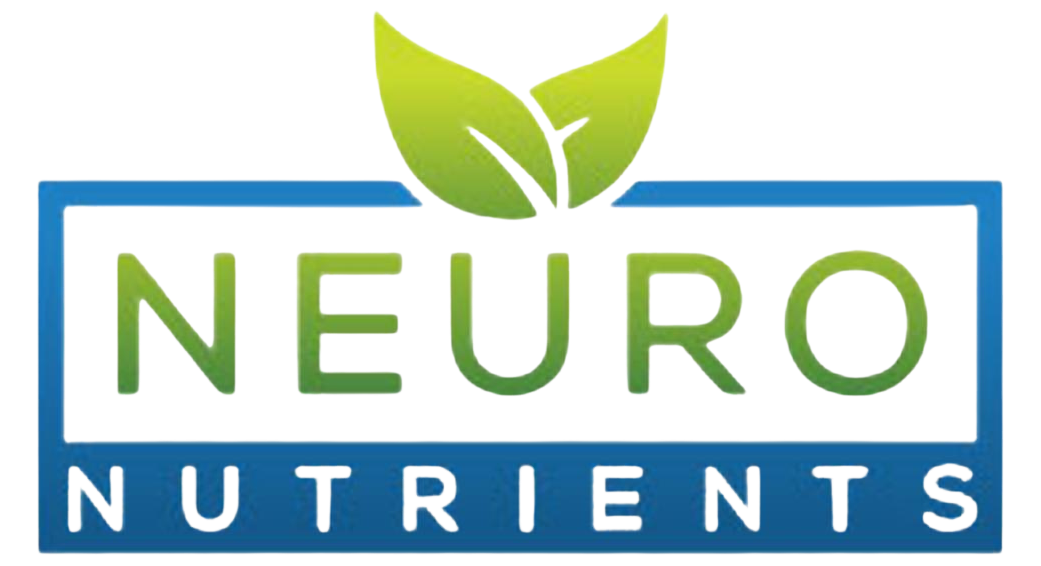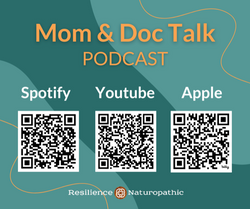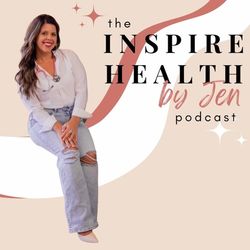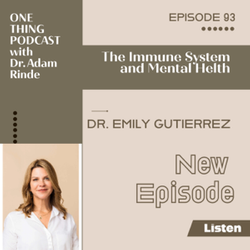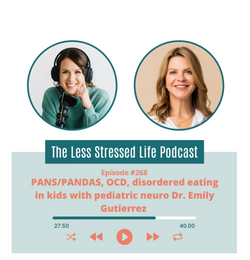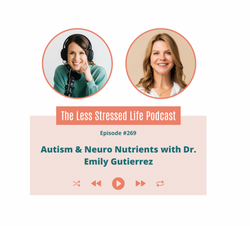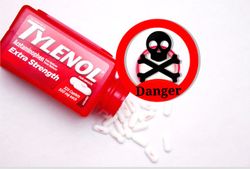Blog & Podcasts
DrTalks Podcast
Dr. Joel WarSH & Dr. Emily Gutierrez
Understanding The Rise In Autism And ADHD In Children
https://drtalks.com/videos/understanding-the-rise-in-autism-and-adhd-in-children/
moreMom & Doc Talk Podcast
Dr. Emily Gutierrez
Genetics & Genomics (part 1)
(Apple: https://podcasts.apple.com/us/podcast/mom-doc-talk-healing-pans-pandas/id1749606591)
(Spotify: https://open.spotify.com/show/3S7W7ryLwnQnU774dmTGgl?si=3f07fd8c105c4716)
YouTube: https://www.youtube.com/watch?v=2-lhNXoTyKI
moreThe Autism Debate: Functional Vs Traditional Medicine
Dr. Emily Gutierrez
The Autism Debate: Functional Vs Traditional Medicine
The seasons are finally changing. In Austin, Texas, this week it has been 90% humidity with triple digits. When you go outside you feel physically effected almost immediately, and most of us say a little prayer that tomorrow might bring cooler weather. Its the end of August, 2024, and any relief from the insufferable heat is welcome. The seasons changing also mean I’ve been spending countless hours preparing to speak at medical conferences in the fall. While public speaking and teaching has become a big part of my career, I never reuse old power point presentations (even though I promise myself I will after the 40+ average hours it takes me to create one). While it would be easier for me, it would be unjust to my audience trying to learn. What does the current evidence tell us? Have we found anything new, anything to help our children grow, develop well, and give them more relief than what we currently know? Or is the standard of care still the same?
Let me back up. I am a doctor of nursing practice- that means my doctoral work at Johns Hopkins was learning to translate the evidence (with clinical problems) to improve patient outcomes. That gap in translation, from what we have learned in science, to how we implement it in practice, is around 17 years. For all of my families with children not growing well, not developing well, not thriving… this is too long. After all, we all know, the earlier the intervention, the better the outcomes.
moreThe Parent’s Roadmap to Autism
Dr. Emily Gutierrez
Holistic and functional medicine nurse practitioner, Jen Ciszewski, FNP, has a great conversation with Dr. Emily Gutierrez on the Inspire Health by Jen podcast.
Did you know that 1 in 36 children are diagnosed with autism today? The mainstream medical approach includes therapy and antipsychotic medications, which can help control the symptoms of autism, but often do not include an evaluation or treatment approach for addressing potential underlying causes. Parents are frequently left without a plan on how to help their child thrive, and can feel hopeless, and overwhelmed on what the future holds.
In this episode, Dr. Gutierrez is paving the way for parents to understand how their child may have arrived at an autism diagnosis and where they can take their child from there on the road of healing. Dr. Gutierrez blends the best of both worlds as an allopathic doctor of nursing practice and certified clinician in the holistic and functional medicine world. If your child has signs or symptoms of neurodevelopmental disorders (such as autism, delayed speech, or not meeting developmental milestones) and you want more than the typical western medicine lackluster approach, this is the episode for you!
moreA Crunchy Moms Rant on Why Quality Is Key To Choosing Vitamins
Dr. Emily Gutierrez
When I first started taking vitamins as a consumer, it was because my OBGYN said I needed to take a prenatal vitamin and folic acid. That was 22 years ago, and wow, things have changed. Now I would never just shop for a multivitamin on Amazon, and to be very clear, I would never take folic acid, especially if I was trying to conceive a healthy child. I didn’t have a clue, I just bought whatever was cheapest, had the least amount of capsules I had to swallow, and dropped it right after I gave birth. Oh boy… if I only knew what I know now, back then.
Fast forward to entering practice in primary care, my next foray into vitamins. My tree hugging, oil rubbing, Austin Moms (also known as “crunchy”) really challenged me on what vitamins to give their kids. They asked lots of questions, and hard ones too! What type of vitamin C for the flu? How much, for how long, and what type? Buffered C, liposomal C, ascorbic acid, ascorbital palmitate? UGH! I didn’t know. But even despite dodging those questions as best as I could (after all, I was a new provider, and I didn’t have a clue how to answer them), these questions just kept coming. I was inadequate, unprepared, and could not partner with these Mommas to help their littles. Lets face it, at that point, I thought Flintstones was a solid try (yikes).
moreThe Immune System and Mental Health
Dr. Emily Gutierrez
The monoamine hypothesis of depression, and other mental health issues, is dead. The body is too complex for it to only be about things like a serotonin deficiency. While we know things like trauma, personal relationships, family systems, and beyond matter in our mental health, so does our immune system. Psychiatrists and other mental health providers are missing a huge piece of the puzzle if they don’t evaluate how the immune system in playing a role in a patients mental health. On this episode with Dr. Rinde, we talk about the immune system role in this very complex interaction with the nervous system and brain.
On Episode #93 of Season Six of The One Thing Podcast with Dr. Adam Rinde. Notes from Dr. Rinde:
This episode comes at an opportune time as many individuals are grappling with shifts in their mental well-being due to seasonal changes, alterations in weather, and fluctuations in the natural environment.
There my be worsening ADHD, Anxiety, Depression, Autism, or PANS/PANDAS fluctuations especially with viral/flu season upon us.
These changes can often spark curiosity about the reasons behind these fluctuations.
What does the immune system have to do on with mental health and behavior? When considering the crucial link between the immune system and mental health, I couldn't think of a more suitable guest than Dr. Emily Gutierrez, whom I had the pleasure of meeting through IntelxxDNA.
moreThe Risks and Benefits of Prescribing Children Stimulants
Dr. Emily Gutierrez
Third grade is one of those milestones of childhood were I see parents struggle a lot. All of a sudden their inattentive and hyperactive child becomes a problem in the classroom, falling behind, and the teacher (unofficially of course) starts telling the parents they need to medicate their child so that they are not a disruption to other students. Parents struggle through parent teacher conferences, attempt to get school accommodations, and wrestling with the question, “do we medicate our child”?
I know this struggle, I’ve been there as a parent myself. On the one hand, you want your child to be successful, be able to sit still, not be impulsive, and learn alongside other students. You also do not want them to start hearing that negative and repetitive feedback… “Jack sit sill. Jack, where is your homework? Jack, please stop interrupting. Jack please stop talking. Jack you’re in trouble…. again”. The constant corrections, discipline, and re-direction becomes wearing on the child, and then their self esteem. They can start to feel marginalized, singled out, and just incapable of meeting up to the teachers (and/or parents) standards. As parents, the last thing we want our children to feel is “less than”, but unfortunately, when ADHD is moderate or severe, this is the message a lot of them start to internalize.
moreDiscussing PANs/PANDAs on the Less-Stressed Life Podcast
Dr. Emily Gutierrez
I had another great conversation with Christa Biegler on the subject of pediatric autoimmune neuropsychiatric syndrome, or PANs, on the Less-Stressed Life Podcast. Christa and I dig into how this condition typically presents and what parents should be aware of and looking for to help their child. If you, or anyone you know, has a child suffering from a sudden onset of OCD, disordered/restrictive eating, behavioral regulation issues, urinary symptoms, separation anxiety, anxiety, tics, or more, don’t neglect to rule out the immune system is playing a pivotal role in how the brain is functioning.
KEY TAKEAWAYS:
- What are PANS/PANDAS, what are the hallmark symptoms, & how to treat it
- What's part of the treatment pie in PANDAS
HELPFUL TIPS ON:
- Testing recommendations for PANS/PANDAS
- How can your PCP rule out strep?
- What supplements can help with the prevention & treatment of symptoms of PANDAS?
With hope for better health for everyone,
Dr. Emily Gutierrez, DNP, C-PNP, IFMCP, PMHS, CCN
Doctor of Nursing Practice, Certified Pediatric Nurse Practitioner, Institute of Functional Medicine Certified Practitioner, Certified Primary Care Mental Health Specialist, and Certified Clinical Nutritionist
moreAn Important Conversation About Autism & Neuro Nutrients
Dr. Emily Gutierrez
I had the pleasure of joining Christa Biegler, RD, on the Less Stressed Life Podcast for an important conversation about autism. My hope is all parents with a child on the spectrum have this foundational knowledge so that they can help their children become the best versions of themselves.
KEY TAKEAWAYS:
- The history of Autism, diagnosis, and hallmark symptoms
- The spectrum & prevalence of Autism
- Standard Treatment, ABA Therapy, & occupational therapy options
- Rule outs and rules in's when the first diagnosis
- The treatment pie of Autism
- The correlation between vaccines & autism
- Testing for mitochondrial dysfunction
HELPFUL TIPS ON:
- How to lower inflammation in the body
- Supplement recommendations to support
- How to get supplements into kids
- What parents can do at home right now
Episode Link: https://kite.link/269-autism-neuro-nutrients
With hope for better health for everyone,
Dr. Emily Gutierrez, DNP, C-PNP, IFMCP, PMHS, CCN
moreUntangling the Truth About Tylenol: Risk of Injury to Unborn Babies and the Development of ADHD and Autism
If you do a google search for “autism and Tylenol” or “ADHD and Tylenol” the search results will likely show several law offices trying to lure families in that have a child with autism or ADHD. You might also hear a radio ad or tv commercial doing that very same thing. There are now several class action law suits that are going after the manufactures of acetaminophen (the generic name for Tylenol) containing products, seeking compensation from those makers for injury of unborn infants due to Tylenol use during pregnancy. This is such an important conversation for us to have, not only for children today that have ADHD and autism, but also for the future unborn generation of children.
There was an important study done in 2018, that was a meta analysis and systematic review, aiming to answer the question, “does prenatal use of Tylenol lead to an increased risk of autism and ADHD”. This means the authors of this study did a thorough and deep dive into the previously published and peer reviewed medical literature, qualifying studies to be included that were high quality, and synthesized their individual findings to answer the intended question. In medical science, when we pool together previously high quality medical studies, the impact of that synthesized data, can be quite compelling, and create a new level of evidence that challenges current medical truth.
morePreparing For Cold And Flu Season: What Vitamins, Minerals, and Botanicals Actually Work?
Practicing in Austin, Texas, a city that values “alternative” health care has come with its challenges. When I was a new provider in clinical practice, I knew the algorithms for when to prescribe Tamiflu, how to treat sinusitis, and certainly which antibiotic to choose first to treat an ear infection. I was well versed on drugs, when to use them for acute illnesses and how long we could “watch and wait” for everything else that had no drug treatment indication. The trouble was, Austin Momma’s didn’t want to “watch and wait” when their children were sick, they wanted to take action with natural medicines!
While I am the type of provider that has an open heart and an open mind when it comes to treating illness (and know that unfortunately our medical system is not 100% free from corruption and big pharma influence), I also am the type of provider that needs to see the evidence. If Vitamin C works for the common cold, well, I need to see the proof. What population was it studied in, for how long, what were the confounders in the study, limitations, results, and most importantly, the safety? The sad truth is the quantity of peer reviewed studies and clinical trials on nutraceuticals have their limitations. There are no big pharma dollars behind studying a non patentable naturally occurring substance. Nature created Vitamin C. You can’t patent it, therefore you cannot profit off of it, therefore the breadth and depth of the clinical research around it is typically not as robust as a drug. While this is the reason that some medical providers are naysayers on using natural supplements to support acute illnesses (plus the pharmaceutical reps are not in their offices pushing them) there is enough evidence for me. There have been clinical trials, a long history of safety, and providers like me have been using them in clinical practice for decades.
moreFour Reasons You Can Trust Our Supplements
At Neuronutrition Associates, we offer pediatric medical care for families. We understand each child requires different medical care, which is why we devise a treatment plan best suited for your child. We offer a variety of supplements to aid in hormone support, mood support, weight management, and much more for both children and adults, and we encourage you to read this blog to discover four reasons you can trust our supplements. Discover the benefits of functional medicine!
morePANDAS and PANS - An Unexpected Twist
Imagine your 8-year-old son is living his best life. He finds humor in everything, makes friends without effort, is carefree, adventurous, easy-going, and absolutely full of joy. One day, things start to change rapidly. His carefree nature turns into incessant worry about things you never imagined he would care about. He appears locked in with obsessive thoughts and rituals. He starts being picky about food, and he has anger and rage episodes. He develops severe separation anxiety and no longer wants to sleep alone in his bed. He regresses so much that he wets the bed. It was going so well for your child just a few weeks ago, and today, you're shocked, scrambling for answers on who (or what) kidnapped your child.
Your first stop might be to your pediatrician, who examines your child and reassures you that there is “nothing wrong”. Despite the reassurance, your parent-gut is screaming to you, “something is very wrong”! You wait a few days but the behaviors continue to worsen, so you return in desperation. The pediatrician once again looks over your son and claims that nothing is physically wrong with him. The pediatrician refers you to a psychiatrist because it is clear your son has developed OCD, anxiety, and likely an eating disorder. There is no history of trauma, no recent changes to his happy life that was abundantly full of joy, and yet your son has developed psychiatric problems.
moreI’m a medical provider, of course “I know it all”.
I’m often asked why I got into functional medicine. To really understand it, we have to go back- back to school, back to my training, and back to my first clinical practice employment. When I graduated from the University of Texas at Austin with my degree as a pediatric nurse practitioner, I felt ready. I had gone to one of the best schools in the county, got a 4.0, graduated with highest honors, and had some of the best mentors during my clinical practice rotations. To top it off, I got my first job with Dr. Valerie Wheelock, a well-known and loved pediatrician. I felt equipped… but boy, I was in for an unexpected surprise.
I had so many parents challenge me in ways that I never expected. They challenged the vaccine schedule, challenged my choice to treat an antibiotic for an ear infection, and sought desperately after the information I had never been taught. Diet? Supplements? Essential Oils? Maybe I learned about scurvy somewhere along the way, or that iron deficiency anemia was a screening lab needed at certain age milestones, but I was never really taught anything about how to advise on nutrition for a growing child. The formula reps were the authority in the pediatric world. Certainly, I knew nothing about supplements, other than to maybe snicker behind someone's back, and label them as “woo-woo” if they were using them. When those parents were on my schedule, I felt anxiety and a sense of doom. Ultimately my ego was challenged. After all, I was a trained provider, wasn’t I supposed to know better than my patients in most things?
moreIntroducing Neuro Nutrients!
The supplement industry is a billion-dollar industry. If you google “supplement for anxiety” about 1,550,000,000 results populate in 0.77 seconds. How in the world could anyone compete with that market, and why would they be motivated to add products to a clearly over-saturated marketplace? The answer is that I already have been using these ingredients in clinical practice for a long time, and there is nothing out there exactly like the products we have created, especially with children in mind. I see them working in real-time, over and over. Let's be clear and upfront- these are not medicines. They are “dietary supplements” which means they are food products and they are not to cure, diagnose, or treat anyone with a medical disease or illness. This is the governments way of allowing us to produce them, just as long as we are clear as to what they are.
BUT- I use supplements as part of my patient management. In my functional medicine private practice, this is what people come to see me the most for. Not for me to reach for my RX pad and get them started on Prozac, but for me to dig deep and figure out what their family member needs in order for them to reach balance as naturally as possible. These dietary supplements are part of my toolbox. I reach for my RX pad 15% of the time and for combinations of supplements the rest of the time. Moms typically don't want to use Vyvanse (which is an amphetamine and has a black box warning on it for abuse and dependence) as first-line therapy for their 6-year-old child with ADHD. Moms want to know what their child needs in order to hopefully avoid controlled drugs altogether, or at least delay the need to even discuss them because their child is blurting out in class and can’t follow 2-step directions.
more